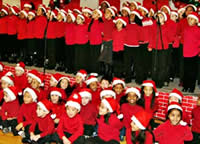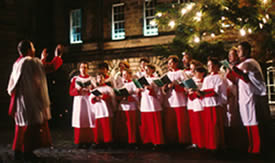Often at this time of the year, when someone realizes I was a public school principal, the topic of religion in school
arises. (I was a middle school principal for 19 years with tenures in Wyoming and Pennsylvania. See the FAQs Section
on this site.) Usually conversation takes the form of questions such as, "As a Christian, how did you handle
 that?" and comments like, "Isn't it sad that you weren't allowed to celebrate Christmas in school."
that?" and comments like, "Isn't it sad that you weren't allowed to celebrate Christmas in school."
I don't know whether this Reflection carries a spiritual message as I hope my usual ones do. But, I do want to share my views on schools and religion as this can be a controversial topic in American society. And, having lived as a Christian in the real world where schools and religion meet, I may have a different perspective than most. (I emphasize that I am talking here about PUBLIC schools, not parochial and other private schools that do not receive public monies.) There are a few points key to my understanding of religion and schools and how, as chief administrator, I tried to deal with the reality of the two.
- Whether I like the thought or not, public schools are an arm of the State, and as principal, I had the role of an officer of the State. In a sense, schools are part of the government.
- Our consititution's First Amendment lays down the basic framework (in my words) that government (including schools) is not to promote nor impede religion. (I always wished our "wise" founders would have thrown in a few examples for school principals!) That "establishment" clause sets up an automatic tension. Whether this tension is held as a creative tension or a destructive one depends on people like school principals and the communities they serve.
- In most cases, schools serve a diverse society, made up of students from a variety of religious backgrounds and of no or even anti-religious backgrounds. Additionally, in a sense, students are a captive audience in their schools, and (especially the very young) are quite impressionable to the opinions of teachers and others in authority.
- Schools should not only teach about fairness, respect, and responsibility, they should also demonstrate those same traits in their rules, programs, and activities. Practices I put into place that recognize the dominant faith tradition, Christianity, should also provide in similar manner for say the Hare Krishna, Islamic, and Jewish faiths. As a Christian principal, I felt both my faith and role of leader in a diverse society calling me to be aware of and sensitive to differences rather than using my position to flaunt the fact that I was a part of the predominant religion. I don't recall ever thinking of this with an attitude of "what we are not allowed to do." Rather, I felt more a sense of what's reasonable, fair, and healthy for kids in this pluralistic environment.
- This one is more personal: Schools (and other governmental agencies) are not good spokespersons to spread the message of Christmas. Entering my first principalship, the tradition on the last day before the holiday break was for students to parade the halls singing Christmas carols on the way to the exits. With boisterous enthusiasm that only a few hundred middle schoolers can generate, I heard them sing/yell Silent Night, sandwiched between Here Comes Santa Claus and Jingle Bells. I thought, "This is not right!" As a Christian, I have to say I was offended. That was the last year for this tradition, and working with my staff, we figured out better a way to let the kids enjoy a holiday spirit. Frankly, I'm not sure why a serious Christian would want to saddle the public schools with the obligation to "tell the story of Christmas."
It is with more than a bit of pride that I think the schools I served kept the "First Amendment" issues in a creative tension. We did not use the Constitution to cop out of controversial issues or simply throw up our hands and complain about what "we can't do." It's always disappointing to hear about schools (and probably their principals) who hide behind the First Amendment to do stupid things like suspend a second grader because she brings a bible to read aloud a passage on the day kids were to share something from their favorite book. Such silliness not only gives a perception of schools as hostile to religion and fuels conspiracy theories, but does an injustice to those serious educators who in sincerity try to walk that honorable, but difficult fine line.
I understand the concern many Christians have that our faith seems to be more and more removed from the public arena. I know schools don't do Christmas the way they did when I was a kid. The courthouse no longer has the manger scene. I understand, and to some extent feel, that sense of loss. But, on the other hand, many Americans distrust government and especially don't want government "messing in those things we hold dear." Why then would we want the State, our government, to be spreaders of the Christian message of Christmas?
It seems to me that if any group has dropped the ball in spreading our message of Christmas, it just might be the churches. What institution and people better to spread the word to the broader community than the church?
A pastor friend tells the story of when he was pastor in suburban Detroit, Michigan, some in the congregation were grousing about how the local courthouse was to stop displaying the traditional crèche scene on its lawn. The pastor listening to the grumbling, said something like, "Let's do something about that!" (I don't remember the whole story, but most likely the grumblers thought he meant something like a protest, petition, or such.) Then the pastor said, "Let's have our own manger scene at our church ... a live one, with animals and all." So they did! Not only was the church and its live manger a focal point for the community, hundreds drove from Detroit and other suburbs. City television stations included the church's efforts on their news. And the Christmas story was told publicly to hundreds. And told by the people who should know the story best and who want to share the story: the church!

Most churches have many special Christmas programs and services for those already within their doors (and such are special and appreciated). But, how many churches pick up the role no longer played by our schools and governmental agencies and become the people who tell the story of Christmas for the public arena? Are we as Christians people who just grouse and moan about what "they" have taken away? Or do we do something about it? Do we look at what creative ways we might tell the story publicly, or do we prefer to complain and subscribe to conspiracy theories?
Thanks for listening. I'll get off my soapbox and start thinking about a Christmas Reflection. May your Advent be a blessed time of preparation. And say a little prayer for that person who sits behind the local school's principal's desk at this time of the year.





